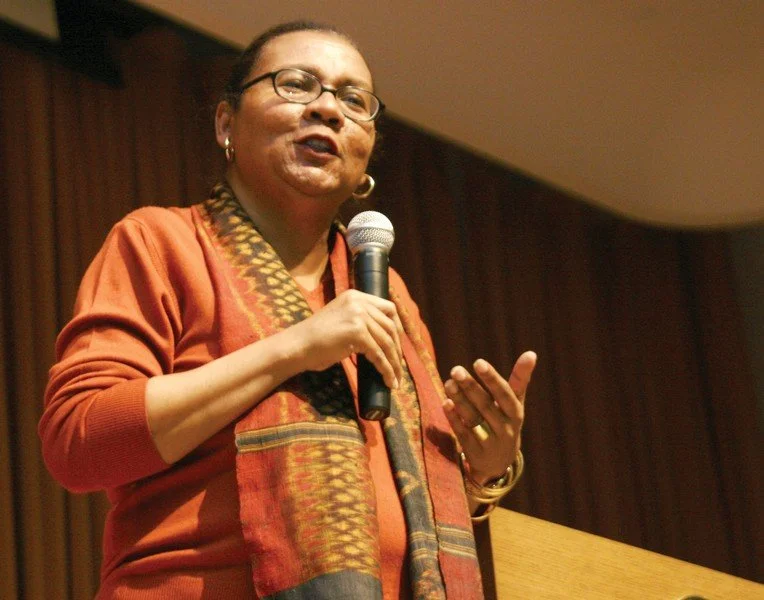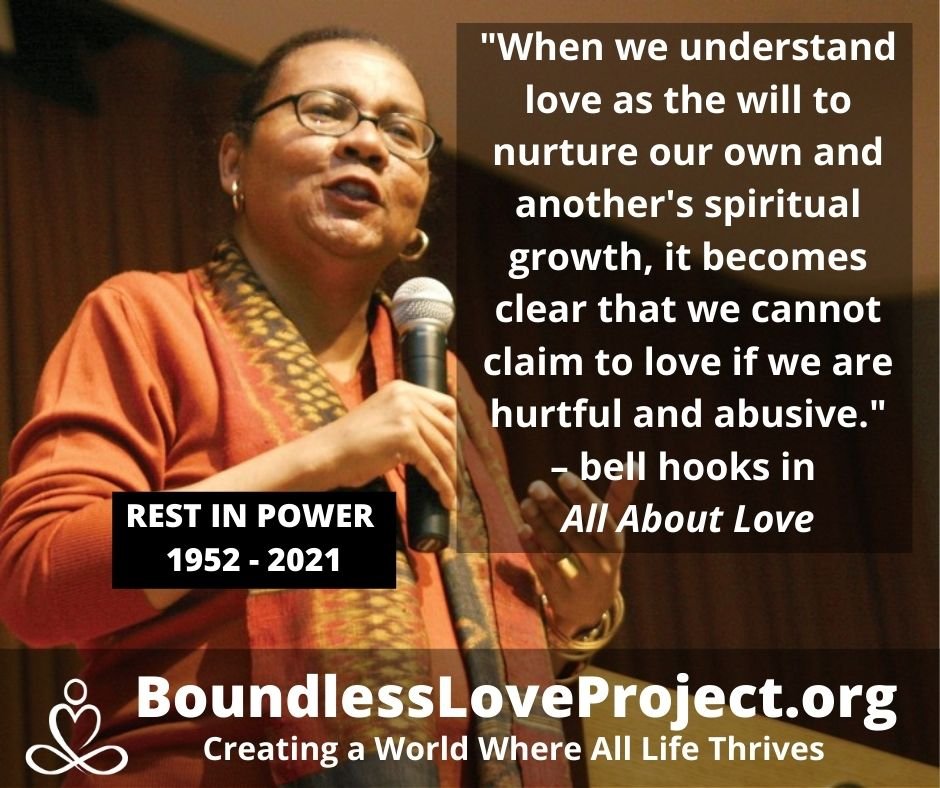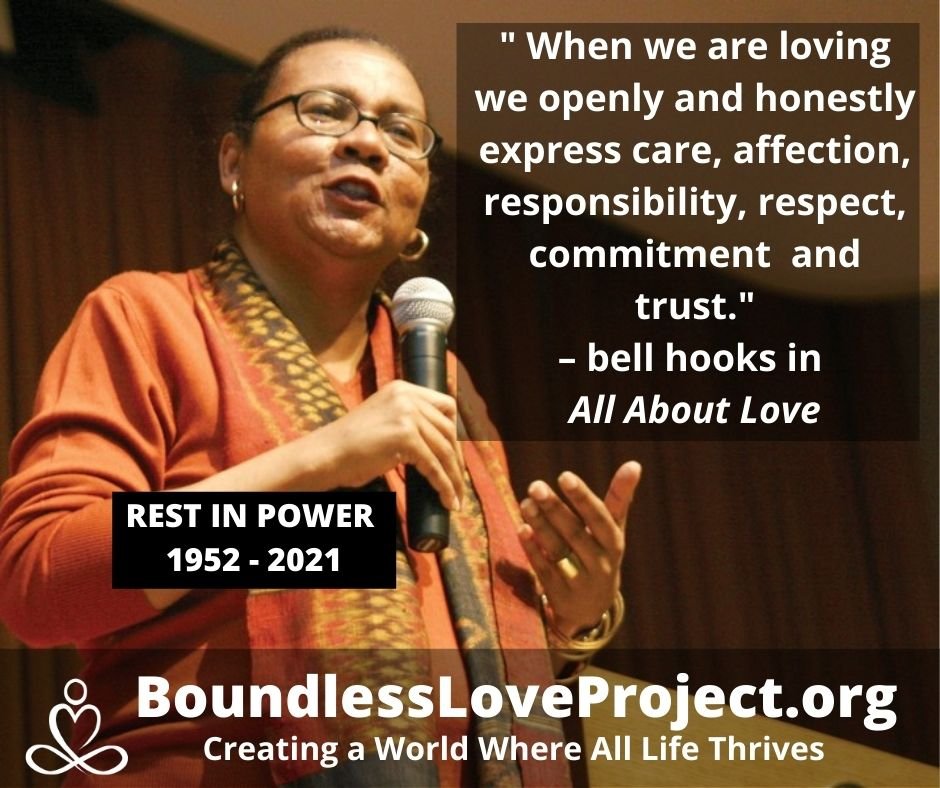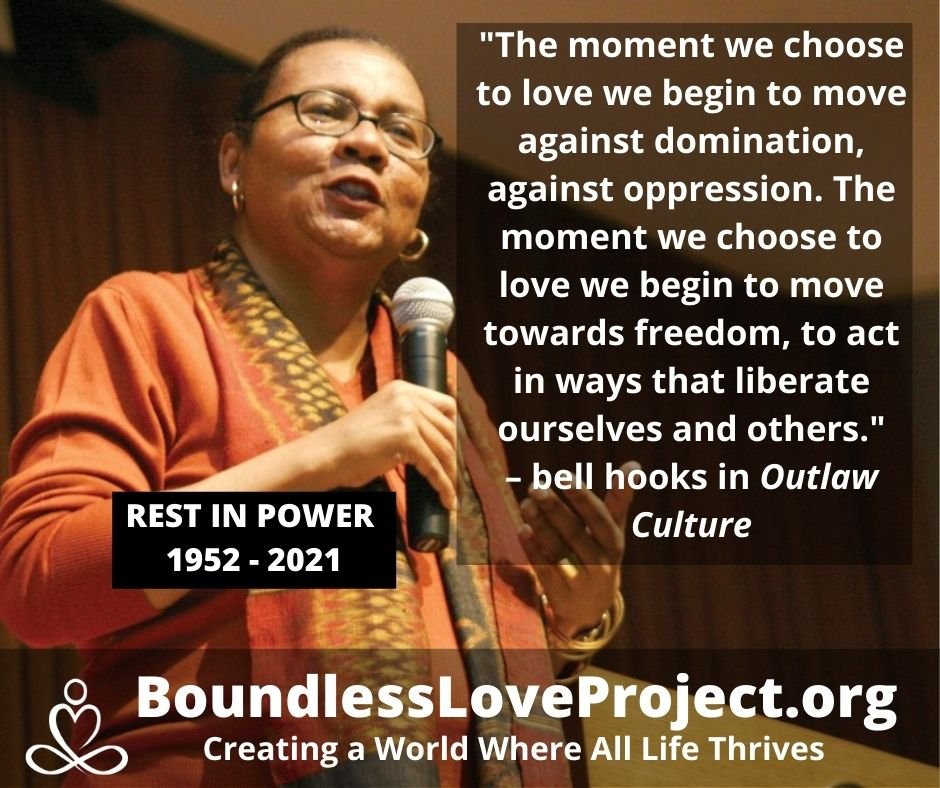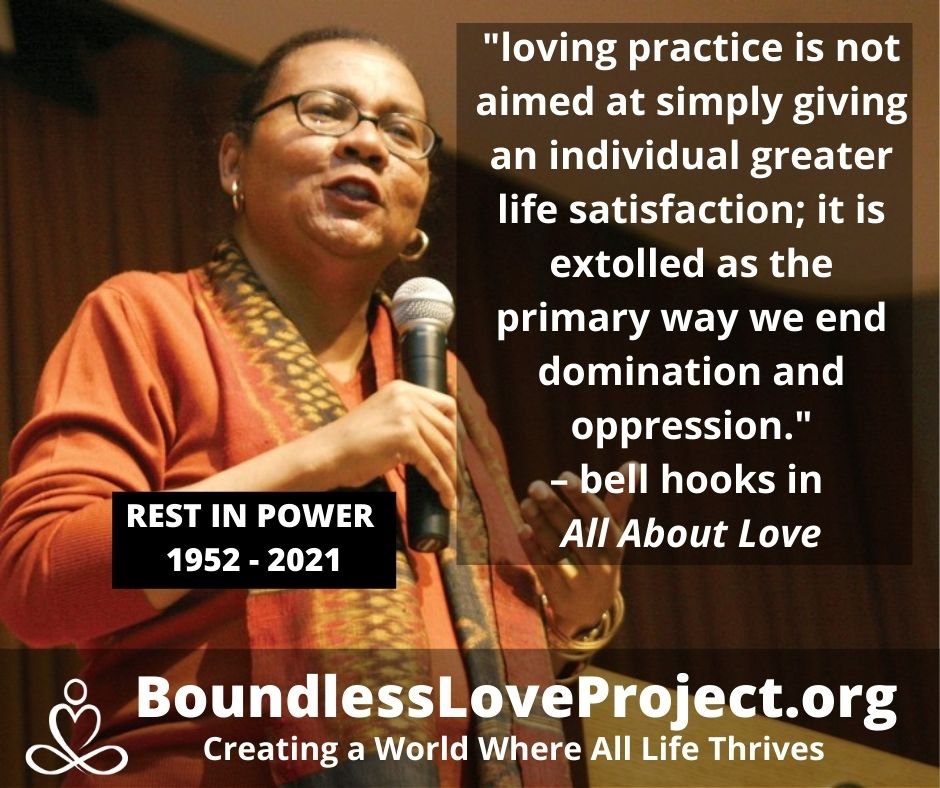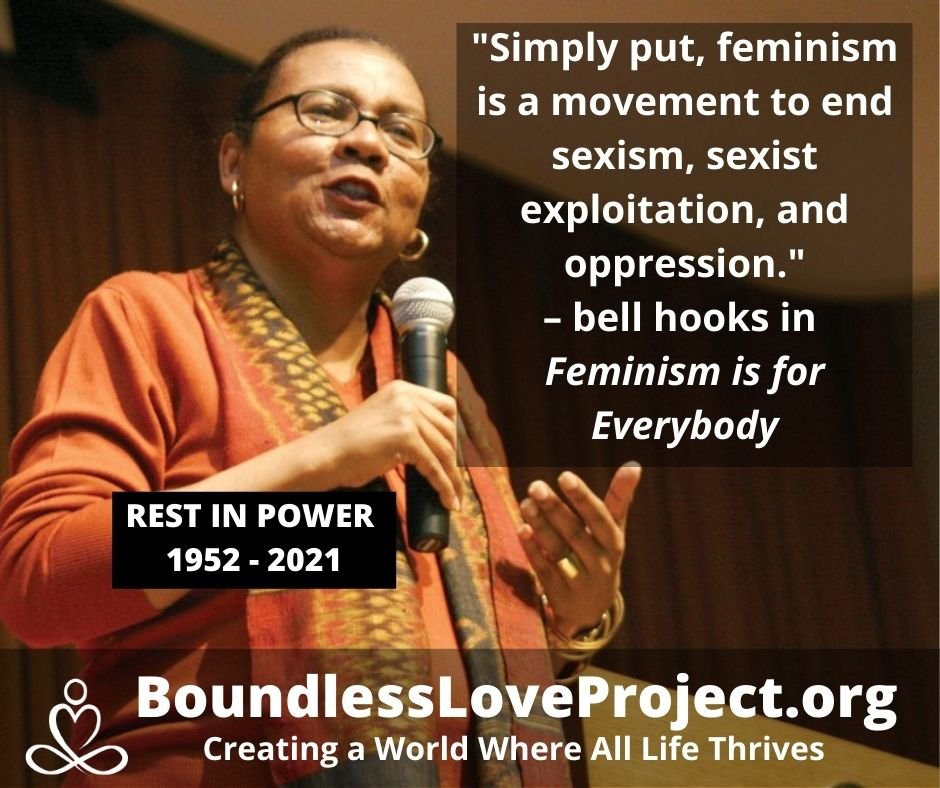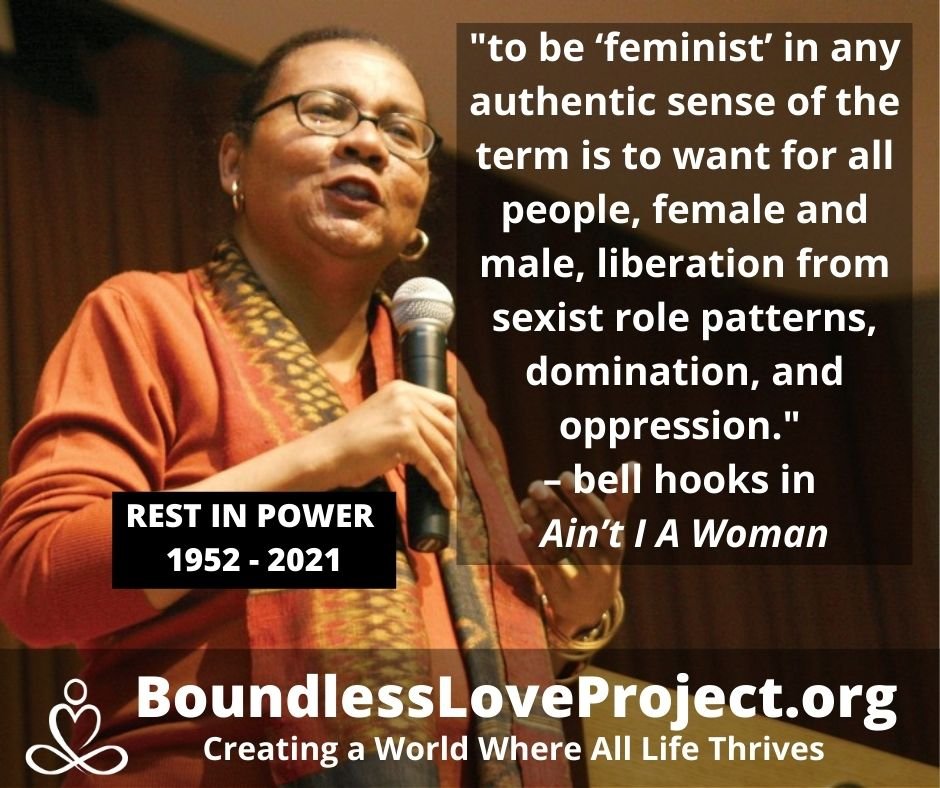Feel free to share these images on your social media pages.
Celebrated author and activist bell hooks courageously used her voice to create Beloved Community. She compassionately pointed out where she saw suffering, exploitation, violence, and domination, without demonizing those who caused the harm. Through her writings and dialogues, she authentically sought to create genuine healing, connection, justice, and community.
At the Boundless Love Project, we mourn her recent passing, and hope that her wisdom will continue to live on and inspire more people to do the inner work necessary to see and let go of our culturally-conditioned prejudices, and live with more love, respect, and tolerance for all people, all beings, and ourselves.
Recommended bell hooks Readings
She wrote over 30 books and many articles. Here are a few we recommend to get you started:
• All About Love. 2001 (Her love-letter to the nation)
• Communion: The Female Search for Love. 2002 (Her love-letter to women)
• The Will To Change: Men, Masculinity, and Love. 2004 (Her love-letter to men)
• Feminism is for Everybody. 2014 (Explains feminism and feminist issues using everyday language)
• Teaching to Transgress: Education as the Practice of Freedom. 1994 (For teachers and students on liberatory pedagogy)
• The Beloved Community: A Conversation between bell hooks and George Brosi. (An article)
Quotes from bell hooks
Here are some examples of quotes from bell hooks that we think share her wisdom.
On the healing and transformative power of love
“loving practice is not aimed at simply giving an individual greater life satisfaction; it is extolled as the primary way we end domination and oppression.”...
- All About Love. 2001
“The moment we choose to love we begin to move against domination, against oppression. The moment we choose to love we begin to move towards freedom, to act in ways that liberate ourselves and others.”
– Outlaw Culture: Resisting Representations. 1994
On creating Beloved Community by not judging others and being radically open, forgiving, and loving towards them.
These excerpts come from the article The Beloved Community: A Conversation between bell hooks and George Brosi.
bell hooks: Community comes not only from engagement and struggle but from a willingness to be open. So, we’re back again to concepts of radical openness. I live my life as a grown black woman in Berea where there are not many adult black women, but I live daily with a sense of belonging to and with everyone that’s here. So even when I see people that visually might look like that hillbilly person with confederate flag and...
george brosi: the “wife-beater” shirt
bell hooks: The whole thing. I send love. The truth of life is that eighty percent of the time, I get that recognition back from whomever I am giving recognition to, and it always reminds me of something that I think about all the time when I think about community, which is not to judge.
* * *
“Two things that are very bad for community making are judgment and blaming. I think that it’s very hard—and I do believe we learn this in small communities if its positive—to maintain friendships with people who don’t think like us. I often laugh and say this is why the Divine Spirit developed the concept of family, because for many of us, it is within the family that we learn that struggle of bonding across difference...”
* * *
“...when we talk about radical openness as essential to the building of community, we have to be willing to hear the voices of people not like ourselves. We have to be willing to respect people’s different ways. It’s been really hard for me. I often think I know what’s best, especially when it comes to ordering other people’s lives. It’s very hard sometimes to accept that somebody may not being doing it your way, but the way they’re doing it is the way that works for them.”
* * *
“It’s when we are able to forgive that we open up the space where our capacity to be close to one another is more important than our capacity to maintain a rift. Two years ago I had a big conflict with the head of Women’s Studies at Berea College. We had previously been both friends and colleagues, and then we had a big conflict around this book, The Help. Both of us immediately stood our ground, and said ‘I don’t have to talk to you, I don’t have to be whatever with you.’ But then, because we are both committed to community, we recognized how crazy that was. If you made a list of the things that we were together on and the things that separated us, there would be a ton of things on the together list and just a couple little petty things on the separating list. What we know in life is that a lot of people let those two things that may have separated them cancel out the hundreds of things that may have bound them together. That, to me, is why the whole quality of forgiveness is so crucial. Forgiveness allows us to look at those differences. It allows me to say, ‘wow, you may have done this thing to hurt me, but look at all the other ways in my life that you may have touched me, that you may have opened up something for me.’ Forgiveness is not about erasing accountability. Forgiveness allows us to let go of a grudge or our rage while at the same time holding on to a concept of accountability. It allows us to let go of blame.”
* * *
“I remember, when I first came to Berea, and I was going to put my Buddha on the porch, people actually said to me, ‘Well, you know there might be people who will shoot at your Buddha.’ And I said, ‘Well, that’s hard to imagine,’ and of course that didn’t happen. But you know what did happen? People did notice that I had a Buddha, and people did ask me about it. There were good Christian people who felt that it was a graven image and therefore was violating to God. But I talked with people, and said, ‘I’ve talked to Jesus, and Jesus understands that I don’t worship at the Buddhas.’ I told people, ‘Jesus told me his heart is big enough for the Buddha, ‘he can hold the Buddha in his heart.’’ I think often that community requires a whole new language and a whole new way of communicating because our language itself is so infused with the politics of domination. It’s either Jesus or the Buddha, and not that there can be a language that looks beyond those categories.”
On the importance of community:
“I think that part of what a culture of domination has done is raise that romantic relationship up as the single most important bond, when of course the single most important bond is that of community. Marriage many years ago was really a communal act. When I think about and wrote about my parents in Belonging, I recognized that part of what kept them committed for sixty years was the fact that their marriage was part of their community life. It was not something that was separate from their community life. We have to beware of the extent to which liberal individualism has actually been an assault on community. The notion that “real freedom” is about not being interdependent, when the genuine staff of life is our interdependency, is our capacity to feel both with and for ourselves and other people.”
- The Beloved Community: A Conversation between bell hooks and George Brosi.
On encouraging us to love justice as a way to transcend our differences:
We can’t combat white supremacy unless we can teach people to love justice. You have to love justice more than your allegiance to your race, sexuality and gender. It is about justice.
- from an interview with Jet Magazine.
On overcoming fear-of-the-”other” by finding community amidst differences:
Dominator culture has tried to keep us all afraid, to make us choose safety instead of risk, sameness instead of diversity. Moving through that fear, finding out what connects us, reveling in our differences; this is the process that brings us closer, that gives us a world of shared values, of meaningful community.
- Teaching Community: A Pedagogy of Hope. 2003
On the definition of feminism:
“Simply put, feminism is a movement to end sexism, sexist exploitation, and oppression. This was a definition of feminism I offered in Feminist Theory: From Margin to Center more than 10 years ago. It was my hope at the time that it would become a common definition everyone would use. I liked this definition because it did not imply that men were the enemy. By naming sexism as the problem it went directly to the heart of the matter. Practically, it is a definition which implies that all sexist thinking and action is the problem, whether those who perpetuate it are female or male, child or adult. It is also broad enough to include an understanding of systemic institutionalized sexism. As a definition it is open-ended. To understand feminism it implies one has to necessarily understand sexism.”
- Feminism is for Everybody. 2014
* * *
...I choose to re-appropriate the term ‘feminism’, to focus on the fact that to be ‘feminist’ in any authentic sense of the term is to want for all people, female and male, liberation from sexist role patterns, domination, and oppression.
– Ain’t I A Woman: Black Women and Feminism. 1981
On defining patriarchy:
I often use the phrase "imperialist white-supremacist capitalist patriarchy" to describe the interlocking political systems that are the foundation of our nation's politics.... Patriarchy is a political-social system that insists that males are inherently dominating, superior to everything and everyone deemed weak, especially females, and endowed with the right to dominate and rule over the weak and to maintain that dominance through various forms of psychological terrorism and violence.
– The Will To Change: Men, Masculinity, and Love, 2004
On how feminism benefits everyone
“Overall, the theory and practice of feminism can transform your life in so many positive ways, starting with calling forth healthy self-esteem and self-love. Feminism offers young women and men incredible tools that can allow them to live well in an unwell society.”
- From an interview in Ms. Magazine.
Examples of how patriarchy harms men:
“The first act of violence that patriarchy demands of males is not violence toward women. Instead patriarchy demands of all males that they engage in acts of psychic self-mutilation, that they kill off the emotional parts of themselves. If an individual is not successful in emotionally crippling himself, he can count on patriarchal men to enact rituals of power that will assault his self-esteem.”
– The Will To Change: Men, Masculinity, and Love, 2004
“In patriarchal culture males are not allowed simply to be who they are to glory in their unique identity. Their value is always determined by what they do. In an antipatriarchal culture males do not have to prove their value and worth. They know from birth that simply being gives them value, the right to be cherished and loved.”
- The Will to Change: Men, Masculinity, and Love, 2004
Here, bell hooks encourages men to improve their lives, live with courage, and throw off the shackles of patriarchy:
“It is not true that men are unwilling to change. It is true that many men are afraid to change. It is true that masses of men have not even begun to look at the ways that patriarchy keeps them from knowing themselves, from being in touch with their feelings, from loving. To know love, men must be able to let go the will to dominate. They must be able to choose life over death. They must be willing to change.”
- The Will to Change: Men, Masculinity, and Love, 2004

